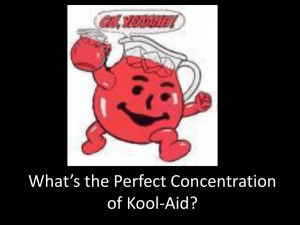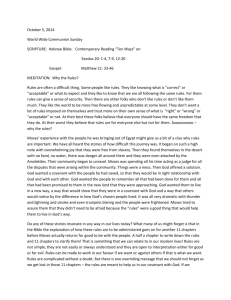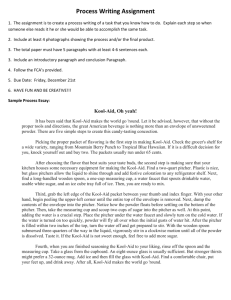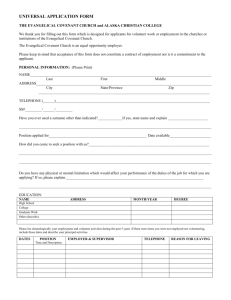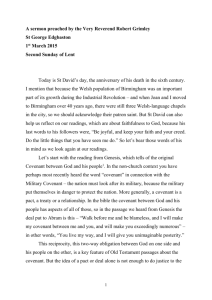First Sunday of Lent: 2/22/15--7:00 and 8:30 AM Several years ago a
advertisement
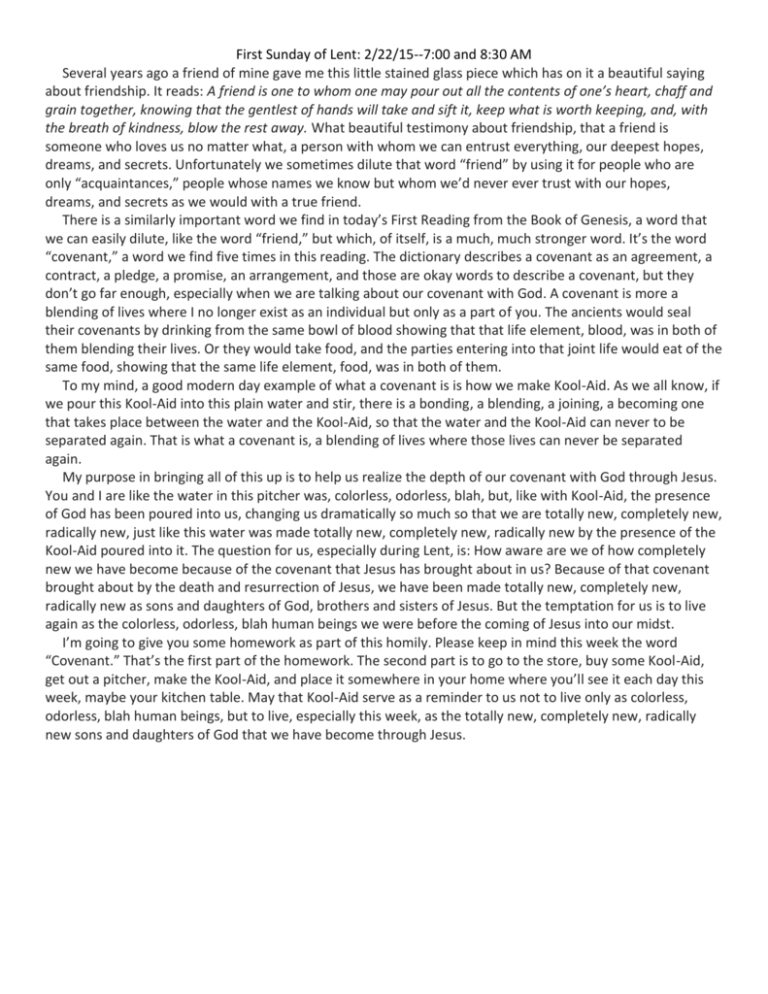
First Sunday of Lent: 2/22/15--7:00 and 8:30 AM Several years ago a friend of mine gave me this little stained glass piece which has on it a beautiful saying about friendship. It reads: A friend is one to whom one may pour out all the contents of one’s heart, chaff and grain together, knowing that the gentlest of hands will take and sift it, keep what is worth keeping, and, with the breath of kindness, blow the rest away. What beautiful testimony about friendship, that a friend is someone who loves us no matter what, a person with whom we can entrust everything, our deepest hopes, dreams, and secrets. Unfortunately we sometimes dilute that word “friend” by using it for people who are only “acquaintances,” people whose names we know but whom we’d never ever trust with our hopes, dreams, and secrets as we would with a true friend. There is a similarly important word we find in today’s First Reading from the Book of Genesis, a word that we can easily dilute, like the word “friend,” but which, of itself, is a much, much stronger word. It’s the word “covenant,” a word we find five times in this reading. The dictionary describes a covenant as an agreement, a contract, a pledge, a promise, an arrangement, and those are okay words to describe a covenant, but they don’t go far enough, especially when we are talking about our covenant with God. A covenant is more a blending of lives where I no longer exist as an individual but only as a part of you. The ancients would seal their covenants by drinking from the same bowl of blood showing that that life element, blood, was in both of them blending their lives. Or they would take food, and the parties entering into that joint life would eat of the same food, showing that the same life element, food, was in both of them. To my mind, a good modern day example of what a covenant is is how we make Kool-Aid. As we all know, if we pour this Kool-Aid into this plain water and stir, there is a bonding, a blending, a joining, a becoming one that takes place between the water and the Kool-Aid, so that the water and the Kool-Aid can never to be separated again. That is what a covenant is, a blending of lives where those lives can never be separated again. My purpose in bringing all of this up is to help us realize the depth of our covenant with God through Jesus. You and I are like the water in this pitcher was, colorless, odorless, blah, but, like with Kool-Aid, the presence of God has been poured into us, changing us dramatically so much so that we are totally new, completely new, radically new, just like this water was made totally new, completely new, radically new by the presence of the Kool-Aid poured into it. The question for us, especially during Lent, is: How aware are we of how completely new we have become because of the covenant that Jesus has brought about in us? Because of that covenant brought about by the death and resurrection of Jesus, we have been made totally new, completely new, radically new as sons and daughters of God, brothers and sisters of Jesus. But the temptation for us is to live again as the colorless, odorless, blah human beings we were before the coming of Jesus into our midst. I’m going to give you some homework as part of this homily. Please keep in mind this week the word “Covenant.” That’s the first part of the homework. The second part is to go to the store, buy some Kool-Aid, get out a pitcher, make the Kool-Aid, and place it somewhere in your home where you’ll see it each day this week, maybe your kitchen table. May that Kool-Aid serve as a reminder to us not to live only as colorless, odorless, blah human beings, but to live, especially this week, as the totally new, completely new, radically new sons and daughters of God that we have become through Jesus.
